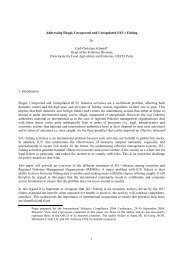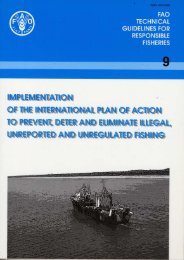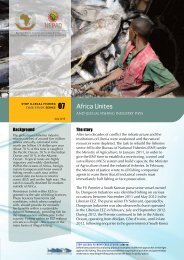Pirate Fish on Your Plate - International MCS Network
Pirate Fish on Your Plate - International MCS Network
Pirate Fish on Your Plate - International MCS Network
You also want an ePaper? Increase the reach of your titles
YUMPU automatically turns print PDFs into web optimized ePapers that Google loves.
6<br />
The<br />
Impacts of<br />
IUU fishing in Guinea<br />
is estimated that the annual loss due to IUU fishing in the<br />
Guinean EEZ is around US$110 milli<strong>on</strong>, the worst in Africa 67 .<br />
The report also estimated that Guinea loses in excess of 34,000<br />
t<strong>on</strong>s of fish every year to illegal fishing, including around 10,000<br />
t<strong>on</strong>s of ‘discards’ – the unwanted porti<strong>on</strong> of the catch thrown<br />
overboard, usually dead or dying.<br />
With Guinea’s annual commercial catch estimated at 54,000<br />
t<strong>on</strong>s, the IUU catch represents a further 63% over and above<br />
these legal recorded catches 68 .<br />
Top left: Marine fishing provides 70,000 direct and indirect jobs in Guinea. Yet Guinea<br />
is estimated to be losing $110 milli<strong>on</strong> every year to IUU fishing, posing a serious threat<br />
to a populati<strong>on</strong> dependent <strong>on</strong> fish stocks for food and livelihoods. ©EJF<br />
Top right: IUU fishing inflicts damage <strong>on</strong> seabirds, marine mammals, sea turtles and<br />
marine biodiversity as a whole. ©Greenpeace<br />
Bottom: Almamy Camara was wounded when his canoe was rammed by a trawler illegally<br />
fishing within the 12-mile z<strong>on</strong>e reserved for artisanal fishers. His three fellow fishermen<br />
drowned. ©EJF<br />
In 2004 and 2005, EJF c<strong>on</strong>ducted field investigati<strong>on</strong>s and<br />
interviews with communities and enforcement authorities<br />
in Guinea, <strong>on</strong>e of the world’s poorest nati<strong>on</strong>s. Lacking the<br />
resources to effectively patrol its territorial waters and enforce<br />
its fisheries laws, Guinea is estimated to be the country most<br />
impacted by pirate fishing in Africa. The country provides a very<br />
clear example of the impacts of IUU fishing <strong>on</strong> the regi<strong>on</strong>,<br />
including severe c<strong>on</strong>sequences for the marine envir<strong>on</strong>ment,<br />
fishing communities, food security, and the country’s overall<br />
development. The results of EJF’s investigati<strong>on</strong> in Guinea<br />
can be found in the report ‘Party to the Plunder’.<br />
In 2006, EJF, together with Greenpeace Internati<strong>on</strong>al,<br />
documented 104 foreign-flagged vessels operating in Guinean<br />
nati<strong>on</strong>al waters. Over half of these – 53 boats flagged to South<br />
Korea, China, Italy, Liberia and Belize – were either directly<br />
engaged in or were linked to IUU fishing activities. Thirteen<br />
were fishing without a licence; another 31 were involved in<br />
other IUU activities such as illegally transshipping (transferring<br />
their catches to freezer vessels at sea); and nine were observed<br />
fishing while deliberately hiding their names and identities.<br />
<str<strong>on</strong>g>Fish</str<strong>on</strong>g>ing is a crucial ec<strong>on</strong>omic and social activity in Guinea.<br />
Marine fishing provides 70,000 direct and indirect jobs – of<br />
which 10,000 are fishermen – and is primarily carried out by<br />
the artisanal sector. It c<strong>on</strong>tributes to food security and the<br />
survival of coastal communities, and specifically benefits women<br />
who process the fish. Catches are mainly of small pelagic species<br />
taken by artisanal fishermen to supply both the local fresh fish<br />
markets and fish smokers 66 .<br />
<str<strong>on</strong>g>Fish</str<strong>on</strong>g> c<strong>on</strong>stitutes an invaluable protein<br />
source for the local populati<strong>on</strong>. Despite<br />
possessing a wealth of marine resources,<br />
there are insufficient supplies to meet<br />
the needs of the Guinean populati<strong>on</strong>. In a<br />
recent report for the UK’s Department<br />
for Internati<strong>on</strong>al Development (DfID), it<br />
Am<strong>on</strong>g the most comm<strong>on</strong> infracti<strong>on</strong>s<br />
are incursi<strong>on</strong>s by trawlers into the z<strong>on</strong>e reserved for artisanal<br />
fishermen, which tend to occur at night, regularly causing<br />
fishermen to lose their fishing gear and canoes, and has even<br />
resulted in the loss of lives.<br />
There is an absence of reliable catch data for Guinean waters,<br />
but catch rates for many species are reportedly decreasing and<br />
in many cases <strong>on</strong>ly juveniles are being caught 69 . Matters are<br />
complicated by the fact that many boats, both licenced and<br />
unlicenced, use fishing gear or practices that are highly damaging<br />
to the marine envir<strong>on</strong>ment or are illegal. Comm<strong>on</strong> infracti<strong>on</strong>s in<br />
Guinean waters include the use of trawl nets with mesh smaller<br />
than the permitted size, destructive bottom trawling, and fishing<br />
within the 12-mile coastal z<strong>on</strong>e demarked by the authorities<br />
exclusively for artisanal fishing, and which also c<strong>on</strong>tains vitally<br />
important spawning and nursery grounds for marine species.<br />
The pirate industrial trawlers that intrude into Guinea’s<br />
coastal z<strong>on</strong>e target shrimp, cephalopods and demersal fish.<br />
These types fisheries have been estimated to be resp<strong>on</strong>sible for<br />
up to 50% of total global discards, whilst accounting for <strong>on</strong>ly<br />
22% of total landings 70 . In fact, tropical shrimp trawl fisheries<br />
are the most unselective and wasteful fisheries in the world,<br />
with the highest discard rate of any fishery, and bycatch-toshrimp<br />
ratios averaging 10:1; in other words, 10kg of bycatch<br />
is caught to secure 1kg of shrimp 71 . Furthermore, trawling<br />
removes vast numbers of juvenile fish needed to sustain fish<br />
stocks and, by dragging heavy nets al<strong>on</strong>g the seabed, habitats<br />
that support marine life are damaged. In heavily trawled areas,<br />
habitats have little chance to recover and in some cases,<br />
may be permanently damaged 72 .<br />
Marine resources in Guinea and the wider regi<strong>on</strong> are clearly<br />
in a perilous state. IUU fishing is resp<strong>on</strong>sible for further<br />
exacerbating the effects of decades of mismanagement and<br />
overexploitati<strong>on</strong> by foreign and domestic fleets, and preventing<br />
the sustainable management of the fishery. Unless acti<strong>on</strong> is<br />
taken to c<strong>on</strong>trol the rampant IUU fishing occurring in the<br />
coastal waters of Guinea and other West African states,<br />
we will witness the collapse of <strong>on</strong>e of the world’s most<br />
productive marine fisheries, and with it, catastrophic impacts<br />
<strong>on</strong> local populati<strong>on</strong>s. It is precisely for these reas<strong>on</strong>s that IUU<br />
fishing is regarded by the internati<strong>on</strong>al community as such a<br />
serious threat to the sustainability of world fisheries.<br />
14

















